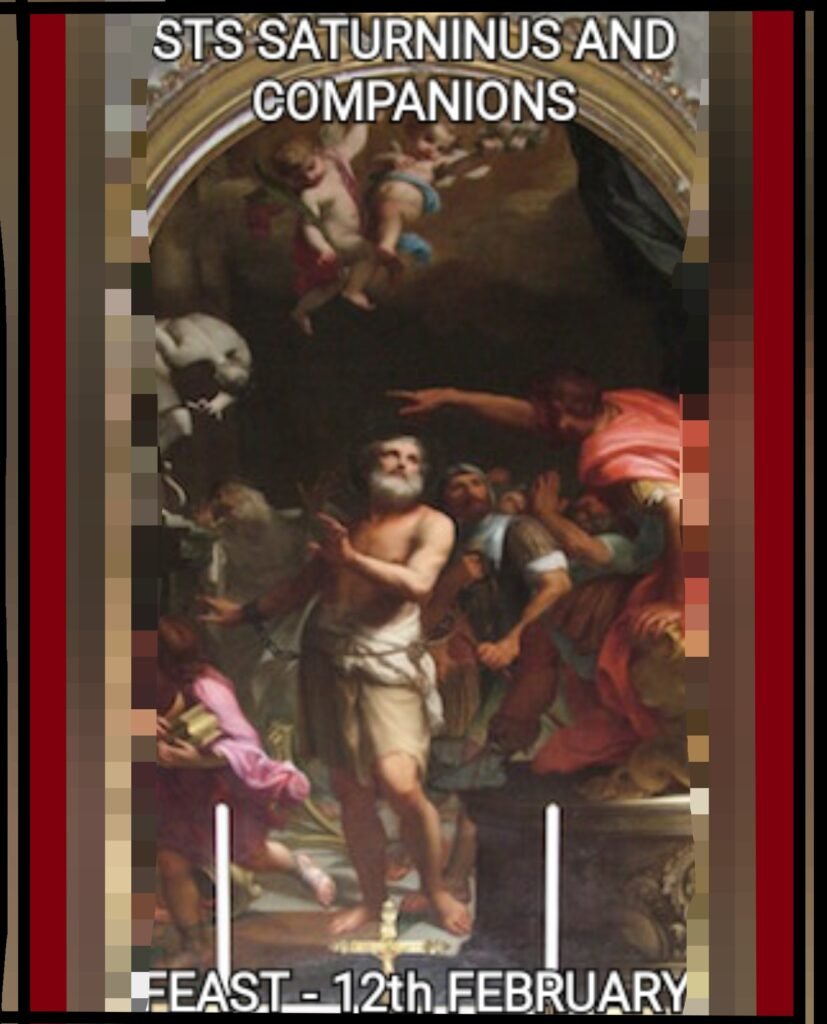FEAST OF STS. SATURNINUS AND COMPANIONS, MARTYRS OF ABITINA IN AFRICA
FEAST DAY – 12th FEBRUARY
The Martyrs of Abitinae (or Abitinian Martyrs) were a group of 49 Christians found guilty, in 304, during the reign of the Emperor Diocletian, of having illegally celebrated Sunday worship at Abitinae, a town in the Roman province of Africa. On February 24 of the year before, Diocletian had published his first edict against the Christians, ordering the destruction of Christian scriptures and places of worship across the Empire, and prohibiting Christians from assembling for worship. All Christians, under penalty of death, had to deliver up Holy Scriptures to be burned.
Fundanus, the local bishop in Abitinae, obeyed the edict and handed the scriptures of the church over to the authorities. This act of sacrilege was followed by a hailstorm, which ravaged the whole country, and a violent rainstorm that extinguished the fire in which the Holy Scripture was thrown. Some of the Christians continued to meet illegally under the priest Saturninus. Saturninus and forty-eight other Christian men, women and children from the same city were arrested during Sunday assemble for refusing to hand over the Scriptures.
They included the four children of Saturninus, of whom the two elder were lectors. The third child, Mary, who was a virgin consecrated to God, and Hilarianus, her brother, a young boy, were arrested and brought before the local magistrates, who sent them to Carthage, the capital of the province, for trial. The trial took place on February 12 before the proconsul Anullinus.
One of the group was Dativus, a senator. He was interrogated, declared that he was a Christian and had taken part in the meeting of the Christians, but even under torture at first refused to say who presided over it. During this questioning, the advocate Fortunatianus, a brother of Victoria, one of the accused, denounced Dativus of having enticed her and other naive young girls to attend the service, but she declared she had gone entirely of her own accord. Interrupting the torture, the proconsul again asked Dativus whether he had taken part in the meeting. Dativus again declared that he had.
When asked who was the instigator, he replied: “The priest Saturninus and all of us.” He was then taken to prison and died soon after of his wounds. The priest Saturninus was then interrogated and held firm even under torture. His example was followed by all the others, both men and women, including his four children, who held firmly to their faith.
These dedicated Christians were brought before the proconsul Anulinus. After some of them were tortured, all appeared before Anulinus, February 11, 304, and strongly defended their Faith before being sent back to prison. The persecutions of Christians were extremely brutal under the Emperor Diocletian, and all the arrested underwent the torture, and zealously professed Jesus. Even their tormentors were impressed with their faith.
It did little to spare them, however. They were shackled and sent to Carthage, the residence of the proconsul. Upon their arrival, some were put on the rack, their bodies torn with iron hooks. Other forms of torture were inflicted on the rest.
The proconsul focused on the youngest child of Saturninus and tried to get him to reject his faith. Hilarianus, however, filled with the Holy Spirit, was not afraid, announcing, “I am a Christian and have been at the collect, and it was of my own voluntary choice, without compulsion.”
The proconsul then threatened him by telling him that he would cut off his nose and ears. The child replied, “You may do it, but I am a Christian.” With this, the proconsul ordered the child and all the others to prison. They all ended their lives under the hardships of their imprisonment except for two, who on Feb. 11 died from their wounds.
One of the responses of the accused has been frequently quoted. Emeritus, who declared that the Christians had met in his house, was asked why he had violated the emperor’s command. He replied: “Sine dominico non possumus” – we cannot live without this thing of the Lord. He was referring to the celebration of the Holy Eucharist that the emperor had declared illegal, but in which they had chosen to participate even at the cost of being tortured and sent to death.
PRAYER
Lord, we devoutly recall the sufferings of Sts. Saturninus and his Companions. Give success to our joyful prayers and grant us also constancy in our Faith.
May we profess and proclaim our faith courageously, in the face of our adversaries. May we have the fortitude to surrender our lives even unto death, for the sake of our faith, in Jesus’ Name. Amen
Sts. Saturninus and companions, pray for us.
